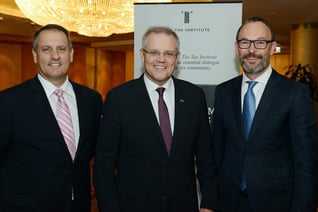
With the catchphrase “jobs and growth” mentioned 13 times in his Budget speech, Treasurer Scott Morrison’s first Budget is all about the Turnbull Government’s 10 year Enterprise Tax Plan to support jobs and boost the economy by directing spending where it is needed and most effective. The question is, what key tax and superannuation measures has the Government brought to the table to actually promote jobs and growth?
13 Budget takeaways
1. Small business
The small business entity turnover threshold will increase from $2m to $10m from 1 July 2016. An additional 90,000 to 100,000 businesses with an aggregate annual turnover of less than $10m will be able to access tax concessions such as the lower small business corporate tax rate, accelerated depreciation and depreciation pooling provisions.
The tax discount for unincorporated small businesses will increase incrementally over 10 years from 5% to 16%. The tax discount will increase to 8% on 1 July 2016.
2. Superannuation
From 1 July 2017, the threshold at which high income earners pay additional contributions tax will be reduced from $300,000 to $250,000. The annual cap on concessional superannuation contributions will also be reduced to $25,000.
3. Personal income tax
The threshold at which the 37% marginal tax rate for individuals commences will increase, from taxable income of $80,000 to $87,000 from 1 July 2016. This stops around 500,000 taxpayers from being taxed at the second highest marginal tax rate.
4. Medicare levy low-income threshold
For singles, the threshold will increase from $20,896 to $21,335. For couples with no children, the threshold will increase from $35,261 to $36,001. The additional amount of threshold for each dependent child or student will be increased from $3,238 to $3,306. The increased thresholds will apply to the 2015-16 income year and later years.
5. Company tax
The company tax rate will progressively reduce to 25% over 10 years, phasing in changes from 1 July 2016. Businesses with an annual aggregated turnover of less than $10m will have a tax rate of 27.5% from the 2016-17 income year.
6. Div 7A
Targeted amendments will be made to improve the operation and administration of integrity rules for closely-held, private groups (in Div 7A of the Income Tax Assessment Act 1936) from 1 July 2018.
A few of these include a self-correction mechanism for inadvertent breaches of Div 7A and appropriate safe-harbour rules to provide certainty for taxpayers.
A post-implementation review will apply from 1 July 2018.
7. Consolidation – deductible liabilities
Integrity measures are in place that prevent a consolidated group from obtaining a double tax benefit when an entity joins the group. The start date is deferred from 14 May 2013 to 1 July 2016.
8. GST
Currently the GST threshold for imported online purchases is $1,000. However, with the new rules, taxpayers will now need to pay GST on low value goods imported from 1 July 2017.
The intent of this measure is that low value goods imported by consumers will face the same tax regime as goods that are sourced domestically.
9. Multinational – diverted profits “Google tax”
A 40% diverted profits tax (DPT) (aka Google tax) on the profits of multinational corporations that are artificially diverted from Australia will be introduced for income years commencing on 1 July 2017. The new tax will target companies that shift profits offshore through arrangements involving:
- related parties that result in less than 80% tax being paid overseas than would otherwise have been paid in Australia;
- where it is reasonable to conclude that the arrangement is designed to secure a tax reduction; and
- that do not have sufficient economic substance.
10. OECD hybrid mismatch rules implemented
Rules developed by the OECD to eliminate hybrid mismatch arrangements will be implemented from 1 January 2018 to target multinational corporations that exploit differences in the tax treatment of an entity.
11. Tax administration
The ATO will establish a tax avoidance taskforce to undertake enhanced compliance activities targeting multinationals, large public and private groups and high wealth individuals. It will conduct operations to improve tax compliance in high tax risk sectors.
12. Tobacco excise
Tobacco excise and excise-equivalent customs duties will be subject to four annual increases of 12.5% from 1 September 2017
13. Wine equalisation tax rebate (WET)
The Government will extend the current brewery refund scheme to domestic distilleries and producers of low strength fermented beverages such as non-traditional cider from 1 July 2017. The scheme will not be extended to most alcopops producers nor wine which benefits from the wine equalisation tax rebate.
Members of The Tax Institute can access our Special 2016-17 Budget Edition of TaxVine for a detailed summary of the Budget.








